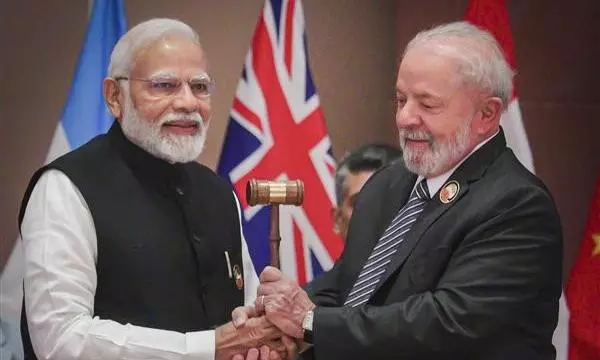
Key highlights of India's G20 presidency as Brazil takes up the mantle
The Federal looks back at some key highlights of India's presidency of the forum comprising the world’s 20 largest economies

In September this year, talking to reporters on the sidelines of the G20 Summit held in New Delhi under India's presidency, Brazilian President Luiz Inácio Lula da Silva expressed hope that the Russia Ukraine war would end by the time Brazil begins its G20 presidency in December.
Even as Brazil is poised to take over the G20 presidency on Friday (December 1), there are no signs of an end to the Ukraine conflict. In fact, one more deadly conflict has erupted in another region causing much angst and concern globally.
Looking back, India too held the two-day G20 summit in New Delhi in September amid global turmoil as well. But, India, who held the G20 presidency, managed to cut through conflicting views on the contentious issue of the Russia-Ukraine war to bring about a consensus in the G20 declaration drawn up at the New Delhi summit. In this way it drove home the voice of the emerging markets as moderators as it also worked closely with Brazil, South Africa and Indonesia.
And, in a reminder of its once leadership position among developing countries, India also made the 54-nation African Union a permanent member of this forum of the world’s 20 largest economies.
Other highlights
The other highlights of the New Delhi Summit involved extending loans to developing countries, reshaping the international debt structure, regulating crypto currency, and management of geopolitical uncertainties on food and energy security.
There was also the emphasis on the need to bring about urgent reforms in multilateral banks and, specifically, lowering the debt burden of 70 low income countries besides sustainable development.
The New Delhi declaration on climate financing placed $5.9 trillion for green financing requirements of developing countries. India's presidency was "really impressive" on the SDGs, digital public Infrastructure, development and climate finance among others, Organisation for Economic Co-operation and Development (OECD) Sherpa, Andreas Schaal, told ANI on Sunday (November 26). "We are living in complex geopolitical challenges, and at this moment, it's crucial to keep formats like the G20 together and actionable. India's presidency was really impressive on the SDGs, Digital Public Infrastructure, development, climate finance...," said OECD Sherpa for the G20, G7 and APEC.
According to Amitabh Kant, India’s Sherpa to G20, the consensus on Russia-Ukraine to make it to the New Delhi declaration – which few imagined was possible -- came after nearly 200 hours of non-stop negotiations, 300 bilateral meetings and 15 drafts.
Ahead of the September Summit, India hosted more than 200 meetings in over 50 cities.
While India invited nine guest countries to New Delhi, including Egypt, Nigeria and Bangladesh, it chose not to invite Ukraine despite the latter’s request.
Critical voices
But despite the talk of bringing the concerns of the Global South to the forefront, the final declaration did not even once use the term Global South – a sign of the leading Western countries’ distaste for the Third World.
Critics also said that India had deferred its G20 presidency to bring it closer to the 2024 parliamentary elections – so as to give Prime Minister Narendra Modi a major political boost.
G20 was set up in 1999 as a forum of the foreign ministers of the Group of 20 countries. It was upgraded to a Summit level in 2008 following the global economic crisis. The next G20 Summit will be held in Brazil under its presidency.

